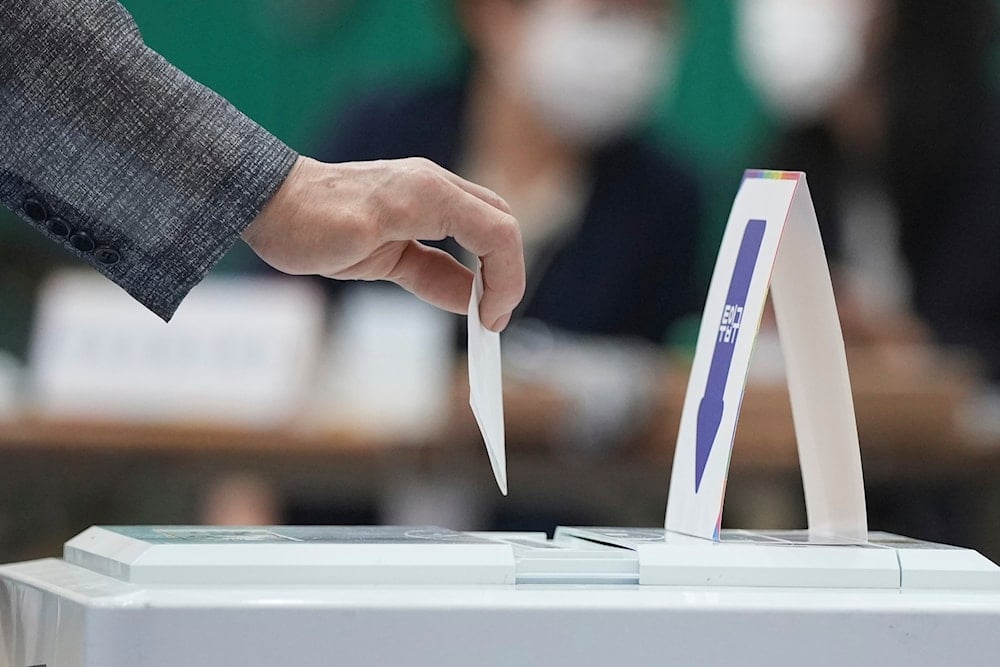South Korea votes for new president amid martial law turmoil
South Koreans headed to the polls Tuesday for the 2025 presidential election, seeking stability after Yoon Suk Yeol's martial law declaration.
-

A man casts his vote for the presidential election at a polling station in Seoul, South Korea, Tuesday, June 3, 2025. (AP)
South Koreans went to the polls for a new president on Tuesday after six months of turmoil sparked by ex-leader Yoon Suk Yeol's brief, shocking martial law declaration, which damaged the country and created an unstable political environment.
Voter turnout is anticipated to be strong, with polling stations open from 6:00 am to 8:00 pm, following early voting in which over a third of the 44.39 million eligible voters already participated. By 11:00 am, 8.1 million voters, just over 18% of the electorate, had cast ballots across 14,295 polling stations nationwide, the National Election Commission reported.
The leading candidates concluded three weeks of intense nationwide campaigning late Monday, traversing the country before gathering in Seoul for their final rallies, where they pledged to move past months of political upheaval and revitalize the struggling economy.
Candidates promise change through different approaches
Liberal frontrunner Lee Jae-myung and conservative rival Kim Moon-soo have both campaigned on promises of transformative change, arguing that South Korea's current political system and economic framework, established during its transition to democracy and industrial growth, are now outdated and inadequate for the nation's needs.
While both candidates share similar visions for investing in innovation and technology, Lee Jae-myung emphasizes greater economic equity and support for middle-to-low-income households, whereas Kim Moon-soo focuses on deregulation and reducing labor conflicts to empower businesses.
Yoon's martial law looms over the polls
Lee has framed the election as a "judgment day" against Kim and the People Power Party, accusing them of failing to sufficiently oppose the martial law attempt and even attempting to preserve Yoon's presidency through their inaction.
Kim has countered by labeling Lee a "dictator" and his Democratic Party a "monster," arguing that if the former human rights lawyer wins the presidency, his administration would recklessly rewrite laws solely based on ideological preferences without proper checks.
Seoul voters expressed hope that the next president would heal political divisions, bring stability, and tackle the real-world consequences of recent martial law turmoil that have directly impacted their daily lives and families.
An 81-year-old voter, Kim Kwang-ma, told Reuters that economic conditions had deteriorated significantly since December 3, a sentiment he said was widely shared, and expressed concern over deepening societal divisions, voicing hope for national unity to reignite South Korea's progress.
Polls show Lee in the lead
Polls released a week before the election showed Lee as the favored candidate, holding a 14-point lead over Kim with 49% public support in a Gallup Korea survey, though Kim had managed to close what had initially been an even larger gap since the campaign began on May 12.
Three major television networks will release exit polls when voting concludes at 8 pm, after which ballots will undergo machine counting followed by a rigorous triple-verification process conducted manually by election officials to ensure accuracy.
The timing of the final result remains uncertain, though in the 2022 presidential election, which was decided by a historic margin of less than 1 percentage point, Lee conceded to Yoon around 3 am the following day in what was South Korea's closest ever presidential race.
The National Election Commission plans to certify the election result on Wednesday, with the winner expected to be inaugurated within hours, bypassing the usual presidential transition period since the office has been vacant since April 4, when parliament impeached Yoon and the Constitutional Court subsequently removed him from power.

 4 Min Read
4 Min Read










